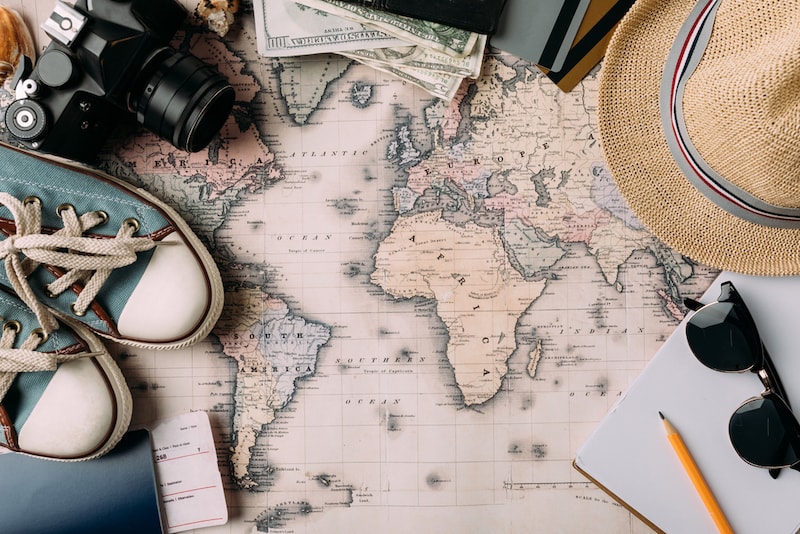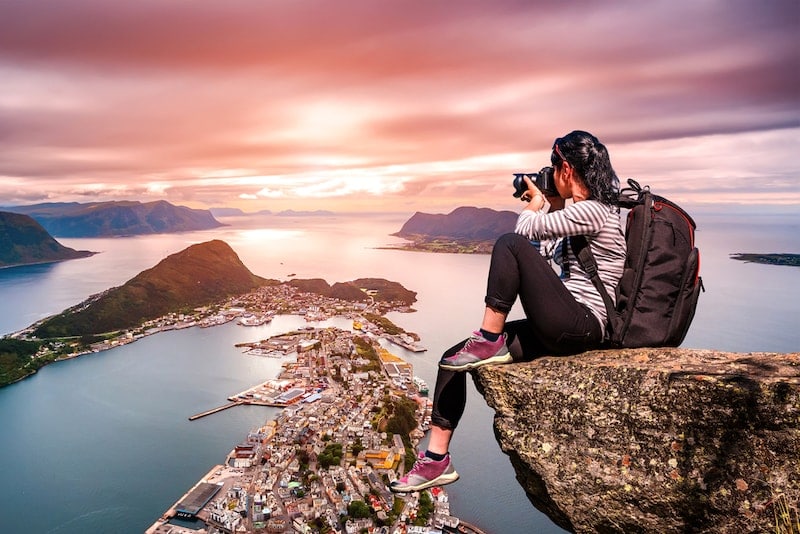This post may contain affiliate links.
What are the benefits of travelling? Let me count the ways. No, seriously. I’m counting. Read on for 10 top reasons to travel, or at least to dream about travelling once this wretched pandemic has been tamed.
A friend once gave me a postcard. A woman was sitting on a battered suitcase, the words “she was often gripped with a desire to be elsewhere” written below. The postcard is lost but the sentiment lives on in my mind.
Because it’s the story of my life. I always want to be elsewhere. Sometimes I want to be in two places at once.
The question is why.

There are so many reasons to travel, even when it’s a frightening leap into the beyond. Maybe it’s because the benefits of travelling are as rich and juicy as an overripe mango from Thailand. Can’t you just feel the drips down your fingertips?
Now picture each of those sweet sticky drips being a reason to travel, and a reason it can change us in transformative ways.
The Benefits of Travelling
1. Travel is Exciting
I thought I’d start out with a selfish reason, as I’m selfish. Travel is exciting.
The buzz of flying into a new city, standing on a glacier, feeling champagne bubbles spritz your nose in a Parisian hotel or turning a street corner in Laos and finding a gleaming temple with a curved red roof gets your blood fizzing like nothing else.
This joy of discovery is one of the biggest reasons why travel is important to me.
2. Travelling Keeps You Young
I may be getting wiser as I age (this is debatable), but I’m also more been-there-done-that. Sitting in an airport in Bucharest, however, listening to flight announcements for Sophia, Istanbul and Zagreb (in addition to making me feel like an international spy) gives me a zinging punch of a travel rush.
Suddenly I’m an impressionable teenager again with her first case of culture shock. Seeing somewhere new, or just hearing the name of it, can give you a jolt of energy and a fresh outlook on life.
Plus, I’m convinced that if you go around the world enough and cross the dateline the right way, you are actually going back in time and are therefore, technically, younger.
Why Travel is Good for You
There are also some physical benefits of travelling:
- A study published in Psychosomatic Medicine shows that people who vacation regularly reduce their risk of heart attack.
- According to an article in the Atlantic, foreign experiences can promote creativity and increase cognitive flexibility.
- In an article on VeryWellMind.com, Elizabeth Scott, PhD, explains that travel can reduce stress and prevent burnout.
What’s not to like?

3. Travel is Freedom
One of the most refreshing advantages of travelling is the freedom it gives you. Suddenly you’ve thrown off the shackles of everyday life.
The thrill lies in the possibilities that open up as soon as you leave home. Who will you meet? What will you see? Where will you go that morning?
We (meaning me) can get boxed in when we’re at home. We eat at the same restaurants, see the same people, walk the same routes. When you travel there are no mind-dulling habits to fall back on. You’re free to carve a new path.
4. Travelling is in Our Nature
Here’s an interesting reason we travel. According to evolutionary psychologists (I blame my husband for boring enlightening me about this), we’re a species of wanderers. There has always been a push to move forward. Whether our roots of exploration go back to a primitive need for survival, curiosity or a desire for power and territory, when we travel we’re answering some sort of primal call.
But let’s unwrap a vital issue right here. Historically the urge to explore, while embracing the spirit of adventure, has also come with darker motivations such as exploitation and colonization. It’s imperative to be mindful of this when we travel. Respect is key.
5. Travel Breaks Cultural Barriers
When I did my MBA at an international graduate school in Seoul (Hello, Yonsei University!), ‘ethnocentric’ was the buzzword of the day. We tossed it around like the worldly jet setters we weren’t (but thought we were).
What does it mean?
Ethnocentrism is the attitude that your own race, nationality or culture is superior to others. It’s the act of judging another culture from your own point of reference. Often we do it unconsciously.
Do I need to mention superiority is not the path to global harmony?
After living abroad in Asia and Europe, and having my own notions of ‘normal’ judged through the lens of another culture, I began to question many things I took for granted. To give you a mild example, take food.
Never, for example, did I think eating steamed silkworm pupae from a street stand would be normal. Yet in Korea, Beondegi is pretty common.
On the other hand, while North Americans might not think twice about blowing their nose at the table, especially if they’re eating something spicy and their nose is running like a mountain stream, it’s considered a disgusting habit in Korea.
Another thing considered disgusting in Korea is wearing your shoes in the house. It makes complete sense. Think of the germs and dirt you’re tracking in.
The point is, cultures are different. Acknowledging this fact means you can stop measuring foreign cultures on a sliding scale of ‘better or worse’ than your own. They’re just … different.
Travelling helps us see our own culture more objectively. (I still don’t eat Beondegi but I take off my shoes indoors.)
Culture, of course, is not a single thing; it’s a trillion interconnected fragments. Some fragments are enviable and some we can learn from.
Travelling helps us discover the best fragments and to look beyond their ‘other-ness’ to understand their roots and purpose, and maybe find common ground.
It can help us examine our own cultural beliefs, and to understand what ‘norms’ we truly believe in our hearts, not simply what has been taught us. This, I think, is a major reason why travel is important.
Check out my article on travel quotes – and why they drive me crazy.
6. The Journey Makes You Brave
Travel is a series of triumphs.
Figuring out how to get to Khao San Road in Bangkok from Suvarnabhumi Airport at 2:00 a.m., navigating a subway in Russia when the stops are written only in Cyrillic, taking a night train from Budapest to Krakow … each accomplishment, no matter how insignificant it may seem, boosts your self esteem and makes you more self reliant.
7. Travel Makes You Fearful
Travel is a series of failures. A taxi driver rips you off. You order off a menu in another language and end up with chicken anus or a lone boiled wiener (I think I preferred the chicken anus). Your backpack is stolen in Banff because you trusted strangers and didn’t lock it up. (Yes, I’m an idiot.)
Tears, anger, frustration: it’s part of the travelling life. Why, you may ask, is this one of the benefits of travelling?
Because you take a deep breath. You learn, you try again and then it ends up as a triumph and you’re proud of yourself all over again.

8. It’s a Connection with the Earth
If you’ve ever flung yourself into the ocean off a Welsh coast so craggy it looks like an upturned comb, you will be acquainted with coasteering, one of the more unusual ways to connect with Mother Earth.
Our world has so many faces, from the parched Atacama Desert to the Amazon rainforest, and travel is the best way to embrace them all.
9. You Can Escape Your Problems
Who says you can’t run away?
Think of your problems as a storm cloud. Underneath it’s a deluge. Move away or fly high enough over it and you’ll eventually find some sun. One of the most wonderful advantages of travelling is that it can make your problems seem small.
10. Travel Makes You Appreciate Mangos and Other Food
Many people (me) say that the way to love a country is through your stomach. What better way to taste joy than with a fragrant dal in Delhi, cold soba noodles with dashi in Nagasaki or tacos barbacoa in Guadalajara?
And, if you’ve ever been to Thailand during mango season, you’ll know that mango sticky rice and other local foods are one of the best flavours, I mean benefits, of travelling of all.
In Conclusion
There are so many more reasons to travel. It’s a chance to break out of our comfort zone, meet new people, create memories and simply have fun. It can improve our communication skills, open our eyes to the diversity of our planet and help us live life to its mango-rich fullness.
For me, the hard part isn’t leaving, it’s coming back from a trip and realizing my journey is done. The good thing is you can fit a lifetime of experiences into a suitcase and unpack them for years to come.
 Best Spas in Ireland
Best Spas in Ireland
Are you going to try the Nomadic Mongolian trip? Eventually of course.
Hard no to both nose blowing at the table and shoes in the house from this North American. Dogs in your bed, however, different story…